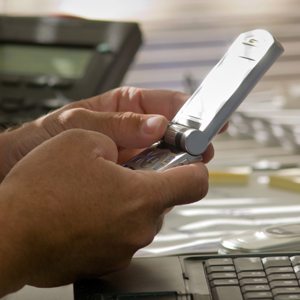 When you’re courting a new client, responding to inquiries and making new connections, taking the time to follow up and make another contact with the other party can often be the deciding factor in landing a new project or missing it entirely. Reaching out can push the arrow in your favor, especially when a client is hesitant to make a decision or if they are considering several people for the opportunity.
When you’re courting a new client, responding to inquiries and making new connections, taking the time to follow up and make another contact with the other party can often be the deciding factor in landing a new project or missing it entirely. Reaching out can push the arrow in your favor, especially when a client is hesitant to make a decision or if they are considering several people for the opportunity.
Following up doesn’t make you pushy or annoying if you are proposing to help solve a problem for the client, and they have expressed interest in what you’re offering. In fact, it’s a vital part of sales.
When you follow up, you are telling the client that:
- You are thinking about them.
- Their work and their needs are important to you.
- You are persistent and dedicated.
- You are ready to work with them and take on their challenges.
- Their project is a priority for you.
- You are consistent and reliable.
Following up is a good way to remind the client that you are there and encourage them to act. It also provides an opportunity to begin to form an authentic and friendly relationship with the client, which can also help to generate a decision in your favor.
There are a lot of ways you can follow up with potential clients, and you don’t always have to use the same method.
Send Them What They Need
The most obvious way to follow up with a potential client is by getting back in touch with them to provide information. If they asked for references, a portfolio or a formal proposal when you spoke, send it to them as soon as possible.
Say Thanks
You can never go wrong by thanking the other party for their time. By sending a thank you e-mail after your initial meeting, you can also provide an overview of the highlights of your meeting, outline the next steps, and schedule a time to have another meeting.
Ask for More Information
After your meeting, take time to review the call and develop a list of questions for the client about the project, the timeline and their specific needs. This can be a part of your thank you message, or sent separately as another method of outreach.
Make a Personal Call
After a few days go by, consider calling the client directly to see if they have questions or would like you to provide additional information. You should also keep the personal call option in your follow-up toolbox in cases where you and the client are having a lot of back and forth via e-mail.
Send Them Something Unrelated
If you come across an article or blog post about something that is relevant to your client, send it along. Even if it doesn’t directly support you or why they should hire you, it will show them you understand their business. This can be invaluable for a potential client to see.
How do you follow up with potential clients? What method works best for you?
Image credit: Craig Jewell
Frequently Asked Questions about the Power of Follow-Up
Why is follow-up so important in business?
Follow-up is crucial in business because it helps to build and maintain relationships with clients. It shows that you value their business and are willing to put in the effort to ensure their satisfaction. Follow-up also provides an opportunity to address any issues or concerns that may have arisen, ensuring that the client feels heard and valued. Additionally, it can lead to repeat business and referrals, which are vital for business growth.
How often should I follow up with clients?
The frequency of follow-up depends on the nature of your business and the relationship with the client. However, it’s generally recommended to follow up within 24-48 hours after a meeting or conversation. Regular check-ins every few months can also be beneficial to maintain the relationship and keep your business at the forefront of the client’s mind.
What are some effective follow-up strategies?
Effective follow-up strategies include personalizing your communication, being prompt, and providing value in each interaction. This could be through sharing relevant information, offering assistance, or simply showing appreciation for their business. Using a CRM system can also help to track and manage follow-ups effectively.
How can I make my follow-up communication stand out?
To make your follow-up communication stand out, ensure it’s personalized and relevant. Address the client by their name and reference specific details from your previous interactions. Also, consider the method of communication – while email is common, a phone call or handwritten note can make a bigger impact.
What should I avoid in my follow-up communication?
Avoid being overly aggressive or pushy in your follow-up communication. It’s important to respect the client’s time and space. Also, avoid sending generic or irrelevant messages. Each communication should provide value and show that you understand and care about the client’s needs.
How can follow-up contribute to long-term business success?
Follow-up can contribute to long-term business success by fostering strong relationships with clients. This can lead to repeat business, referrals, and a positive reputation. It also provides opportunities for feedback and improvement, helping your business to continually evolve and meet the needs of your clients.
Can follow-up help in resolving issues or conflicts?
Yes, follow-up can be a powerful tool in resolving issues or conflicts. It shows the client that you are committed to addressing their concerns and finding a solution. It also provides an opportunity for open communication and understanding, which can help to prevent similar issues in the future.
How can I track and manage my follow-ups?
Tracking and managing follow-ups can be done through a CRM system or other project management tools. These can help to schedule reminders, track communication history, and manage tasks related to follow-up.
What role does follow-up play in customer satisfaction?
Follow-up plays a significant role in customer satisfaction. It shows the client that you value their business and are committed to ensuring their satisfaction. It also provides an opportunity to address any issues or concerns, enhancing the overall customer experience.
Can follow-up impact the reputation of my business?
Absolutely, follow-up can significantly impact the reputation of your business. Consistent, thoughtful follow-up can enhance your reputation, showing potential clients that you are reliable, professional, and committed to customer satisfaction. Conversely, poor or non-existent follow-up can harm your reputation, potentially deterring future business.
Alyssa Gregory is a digital and content marketer, small business consultant, and the founder of the Small Business Bonfire — a social, educational and collaborative community for entrepreneurs.


